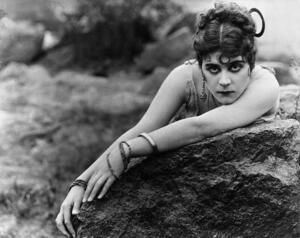Vampire Mania: Paying tribute to the original "vamp"
We are a country in the grips of vampire mania. Twilight books and movies have become a cultural phenomenon approaching Harry Potter levels, and for those with more discerning tastes there is HBO's True Blood. Though I have only watched one Twilight film (team Jacob?) and arrived a little late to the True Blood party, I have found one aspect of the vampire craze to be quite delicious: gender equality among vampires.
At least in True Blood, vampire heirarchy is determined primarily by age, not gender. Since a vampire's supernatural power is determined by age rather than by physical traits, female vampires have no gender-based disadvantage, socially or physically. As a result, we see plenty of strong and powerful vampire women in these stories. Did you know that the first woman to play this role—the original "vamp"—was a Jewish woman?
This month marks the 120th birthday of Theda Bara, a Jewish actress who is credited with creating the archetype of exotic, cruel, seductress—the "vamp." Theda Bara does not feature prominently in our cultural memory, but during her own time she was wildly popular.
Last year Jordan wrote about Theda comparing her to Sophie Tucker, who's career followed a similar trajectory. Both women moved to New York at age 18 to begin careers in show business, and both became known for their sexy, larger-than-life stage personas. While Sophie Tucker's legacy continues to be ever-present in our cultural past and present, Theda Bara's story has been lost to the ages. (Well, not now that she's been included in JWA's Jewish Women: A Comprehensive Historical Encyclopedia, of course!)
Theda Bara's first film, A Fool There Was, propelled her to stardom. In it, she played a vampire who "squeezed everything out of men—money, dignity, and finally life itself." In defense of her role, she said, "The vampire that I play is the vengeance of my sex upon its exploiters. You see, I have the face of a vampire, but the heart of a feministe." But she also worried about the image she perpetuated: "I try to show the world how attractive sin may be, how very beautiful, so that one must be always on the lookout and know evil even in disguise." Besides, she added, "Whenever I try to be a nice, good little thing, you all stay away from my pictures."
Jordan wrote:
Why should we remember Theda? Not only did she originate an archetypal character of American cinema, but she was also the victim of that very character—her career stalled when notions about sexuality changed.
Theda’s story is a caveat that sometimes the legacy we work for is not the legacy we earn. We at the JWA tell the stories of women whose lives have been hidden by time and in doing that are happy to find stories about women, like Theda, whose legacies should not be forgotten.
This video is the only known audio clip of Theda Bara speaking at LUX Radio Theatre in 1936 about switching from silent films to the "talkies."







